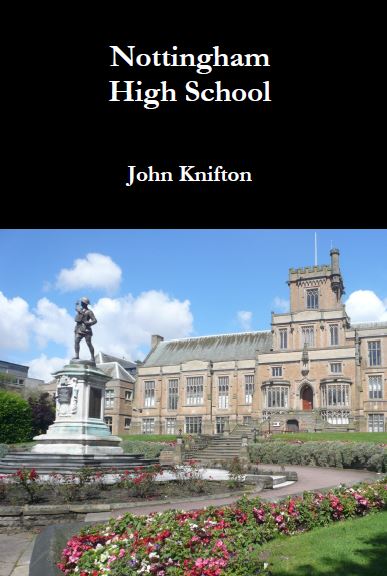The author of the following poem which appeared in the Nottinghamian of December 1940 was Robert Norman Walters of VI Classics. Robert was the son of a “Master Fruiterer” and lived at 159 Cinder Hill Road in Bulwell. He was in the High School from 1930-1941. The winter of 1940-1941 was legendary for its severity and was excellent practice for anybody thinking of taking a winter break in Stalingrad a couple of years later.
SNOW
Snow shall fall and ice
Shall bind the lane in slithering shields
Of white and whitish blue.

Winds shall blow and howl and roar
And tiles shall fall.
Wood shall burst and split
Like statues known of old.
Rivers may cease to run
When snow shall whirl and swirl
And formless roofs gleam white.
Yet when this comes,
Let our strong, deep affections
Unfrozen, freeze not.
But with winter seen afar
Retain the burning heat
Of mid-June’s torrid air.
Robert left to go to Jesus College, Cambridge to study Classics. In the section of his poem :
“Winds shall blow and howl and roar
And tiles shall fall.
Wood shall burst and split
Like statues known of old.
Rivers may cease to run”
Robert has come remarkably near the words of Wace, who was possibly Robert Wace, a Norman poet, born in Jersey and brought up in mainland Normandy.

Wace was the first author to speak of the Round Table and the Court of King Arthur :
“Eventually
All things decline
Everything falters, dies and ends
Towers cave in, walls collapse
Roses wither, horses stumble
Cloth grows old, men expire
Iron rusts and timber rots away
Nothing made by hand will last.
I say and will say that I am
Wace from the Island of Jersey”
Wace lived, approximately, from 1100-1180.
James Theodore Lester was the son of a Leather Factor & Manufacturer who lived at 42 Bedale Road in Sherwood and then at Castleton House at 5 Castle Avenue in Arnold. The poem occasionally struggles for a rhyme, but the last verse is lovely.
“When I was six”
“When I was six I’d play at boats
And build a fort with many moats
Which I’d replenish with my pail
And put my little boats to sail.

Round and round and round they’d go
Till the water ceased to flow.
Then back home I would repair
And sit upon my rocking chair.
When it was time to go to bed,
Upon the pillow I’d put my head,
And think and dream of things I’d done,
And call the day a happy one.
We’ve already seen Frank Alan Underwood of 51 Charnock Avenue in Wollaton Park with his poem ““Evacuated”. This poem is a lot deeper and a lot more chilling. It was published in April 1943.
THE MIRROR
The dead man lay upon his bed
In the pause at dawn ere the Soul had fled,
And the Lamp burned dim as the East glowed red.
The Soul rose as the man had done
For twenty years at the beck of the sun:
But as yet it knew not that Death had won.
Then still as man and not aware
It looked in the mirror to brush its hair
–Looked in the mirror and found nothing there.
Ivan Keith Doncaster wrote a poem in The Nottinghamian in March 1937 which was pretty good:
THE FISHPOND
There’s a fishpond in our garden,
Not very big or wide ;
But fish just love to dart about,
Among the rocks inside.

And if you sit there on the bank,
You’ll see a sudden flash—
A big fat frog has just dived in,
And made a dreadful splash.
The frightened fish swim swiftly round
In search of safe retreat,
The frog looks at the golden line,
And croaks his sad defeat.

When ice seals up our gold-fish pond,
Neath winter’s frozen spell ;
We just catch golden gleams below,
To tell us all is well.
In summer when the fountain plays,
And sends forth silver rain,
The fish all frolic in great glee,
As cooling showers they gain.
We feed the fish with large ant eggs,
And when the days are warm
They jump to catch the flitting flies
Which o’er the pond do swarm.
Some happy moments there we spend,
Watching the fish at play ;
Spring, Summer, Autumn, Winter too,
They move in swift array.
Ivan Keith Doncaster only lived from 1923-1944 but he had already succeeded in the previous year in writing the most beautiful piece of poetry by any High School boy, bar none. It summarises how much we love our oh-so-beautiful lives, yet all the time are well aware of the price we will all one day pay as the distant bells toll our inevitable doom.
Keith paid his price in the mid-upper turret of a Lancaster over the German city of Kassel on October 22nd 1943, five days after his 20th birthday.
This poem appeared in April 1936 and had Keith lived, he would have been a great poet. He has a masterful touch and is capable of the most astonishing subtlety.
GATHERING SHELLS
“Along the silvery beach we run,
Gathering coloured shells.
We think that gathering shells is fun.
Along the silvery beach we run.
And as we go beneath the sun,
We hear the distant bells.
Along the silvery beach we run,
Gathering coloured shells.”

I have read that poem literally hundreds of times and I do not even begin to tire of it.







































